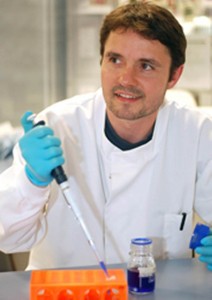
A simple lab-based blood test could potentially identify which cancer patients would get harmful side-effects from antibody immunotherapy treatment, a new Southampton study has shown.
In recent years, antibody immunotherapy has become more commonly used to treat several cancers including lymphoma and breast cancer. Therapeutic antibodies bind specifically to cancer cells alerting the immune system to destroy them while other types of antibody therapies are designed to target immune cells themselves, boosting their anti-cancer functions.
However, responses to these types of therapy vary between patients, with some experiencing side-effects, of which cytokine release syndrome (CRS) is the most detrimental to patient safety. CRS symptoms include fever, nausea, headache, rash, rapid heartbeat, low blood pressure, and trouble breathing. Most patients have a mild reaction, but sometimes, the reaction may be severe or life threatening. If patients experience CRS, their cancer treatment can be restricted or stopped.
In a new study, published in the Frontiers in Immunology , scientists at the Centre for Cancer Immunology in collaboration with UCB, have discovered that subtle variants of antibody receptor genes called FCGR2A and FCGR3A may increase the likelihood of CRS in patients treated with antibodies. The team was only able to see this impact when using a certain type of blood test called an assay. They believe it could help predict the likelihood of CRS in patients before they take part in clinical trials with new therapeutic antibodies.
Mark Cragg, Professor of Experimental Cancer Research at the University of Southampton, led the study and said: ŌĆ£Using a whole blood assay we were able to see which genes might affect the occurrence of CRS. The assay takes about three to four days to complete so it is not a bedside test however it would be quick enough to give more information to a clinician and their patient before they embark on a clinical trial which could result in them having debilitating side-effects.
ŌĆ£However, it is important to say it is still very early ŌĆō we still need to test the assay with clinical data to see if its predictions are accurate however these are very interesting results which could have a positive impact on patientsŌĆÖ lives.ŌĆØ
The study was funded by Cancer Research UK.